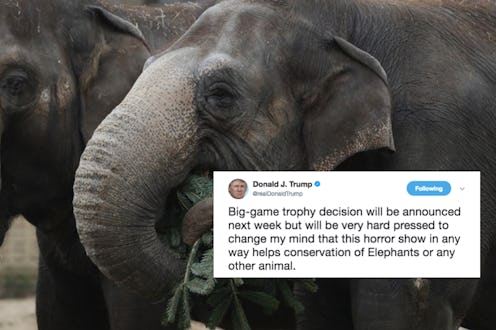
On Friday evening, President Donald Trump said that elephant trophy imports won't be legalized as quickly as the U.S. Fish And Wildlife Service had announced two days earlier. In a tweet, he announced the policy reversal and said a decision would be on hold until it could be more thoroughly examined. But on Sunday evening, he posted a follow up tweet that suggests he is unlikely to support lifting the trophy import ban at all.
"Put big game trophy decision on hold until such time as I review all conservation facts," Trump tweeted on Friday. "Under study for years. Will update soon with Secretary Zinke. Thank you!" On Sunday, he followed up:
Big-game trophy decision will be announced next week but will be very hard pressed to change my mind that this horror show in any way helps conservation of Elephants or any other animal.
On Wednesday, the U.S. Fish and Wildlife Service said it would begin issuing permits to allow hunters to import elephant "trophies" from Zimbabwe. African elephants are considered to be threatened species under the Endangered Species Act, so these trophies are only allowed to be imported if the manner in which the elephant was hunted could be demonstrably proven to assist in the survival of the animal species as a whole.
A ban on trophy imports from Zimbabwe was put in place under the Obama Administration in 2014 because Zimbabwe reportedly did not have sufficient conservation data to accurately convey whether the hunts there were useful for the species or not. Less than two weeks prior to the announcement about Zimbabwe, the Wildlife Service had also announced it would lift a similar ban on elephant trophies imported from Zambia. Trump's Sunday tweet is understood to apply to both Zimbabwe and Zambia.
U.S. Secretary of the Interior Ryan Zinke confirmed in a statement Friday that the policy was under review:
President Trump and I have talked and both believe that conservation and healthy herds are critical. As a result, in a manner complaint with all applicable laws, rules, and regulations, the issuing of permits being put on hold as the decision is being reviewed.
Part of the debate around the importation of big game trophies questions whether hunting a species could ever reasonably help it survive. Proponents of trophy hunting argue that the money that comes from permits is funneled back into conservation efforts and the communities where big game hunting takes place. Opponents question whether that's the case, and point to the increasingly dwindling numbers of African elephants in recent years. According to National Geographic, elephant populations in Zimbabwe have diminished 11 percent since 2005. Some parts of the country are reported to have witnessed as much as a 74 percent decline.
Allowing legal hunting might also make room for illegal hunting. "There’s a real concern that legal hunting of elephants provides cover for illegal hunting. When trucks, guns, and hunters are allowed on the landscape, rangers don’t know who’s who," Tanya Sanerib, senior attorney from the nonprofit Center for Biological Diversity, told National Geographic.
When last week's initial announcement was made public, critics stormed social media to speak out against the decision. "Beyond morally repugnant, there's something so psychologically broken about the desire to cowardly slaughter animals and parade them as trophies," tweeted journalist Glenn Greenwald. "Get your self-esteem elsewhere"
Comedian and talkshow host Ellen Degeneres began the campaign #BeKindToElephants in response to last week's controversy. On her show, she said that she would make a donation to elephant conservation initiatives for every share the hashtag received. "They're worth fighting for and we owe it to them to protect them," she said on her show. "They're extremely sensitive beings."